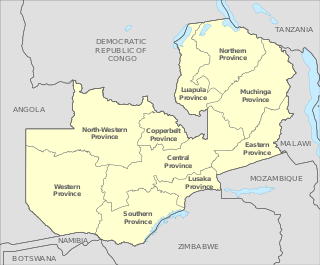
Zambia is divided into 10 provinces for administrative purposes. Each province is headed by a minister appointed by the President and there are ministries of central government for each province. The administrative head of the province is the Permanent Secretary, appointed by the President. There are Deputy Permanent Secretary, heads of government departments and civil servants at the provincial level.

Northern Province is one of Zambia's ten provinces. It covers approximately one sixth of Zambia in land area. The provincial capital is Kasama. The province is made up of 12 districts, namely Kasama District, Chilubi District, Kaputa District, Luwingu District, Mbala District, Mporokoso District, Mpulungu District, Mungwi District, Nsama District, Lupososhi District, Lunte District and Senga Hill District. Currently, only Kasama and Mbala have attained municipal council status, while the rest are still district councils. It is widely considered to be the heartland of the Bemba, one of the largest tribes in Zambia.
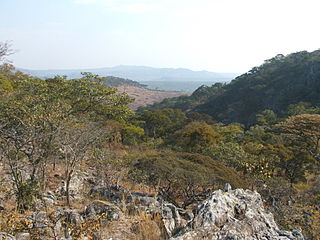
Central Province is one of Zambia's ten provinces. The provincial capital is Kabwe, which is the home of the Mulungushi Rock of Authority. Central Province has an area of 94,394 km (58,654 mi). It borders eight other provinces and has eleven districts. The total area of forest in the province is 9,095,566 ha, and it has a national park and three game management areas. The first mine in the region was opened up in 1905 making the then Broken Hill town the first mining town. In 1966, he town's name was reverted to its indigenous name - Kabwe meaning 'ore' or 'smelting'.

Lusaka Province is one of the ten provinces of Zambia. Its capital is Lusaka, which is also the national capital. It is the smallest province in Zambia, with an area of 21,896 km2. Lusaka is also Zambia's most populated and most densely populated province, with a population of 2,191,225 and density of 100 persons per km2 as of 2010. It is the most urban province, with the most doctors and fewest malaria-related incidents. The province is bordered by Zimbabwe and Mozambique, and separated by the Lower Zambezi National Park.

Southern Province is one of Zambia's ten provinces, and home to Zambia's premier tourist attraction, Mosi-oa-Tunya, shared with Zimbabwe. The centre of the province, the Southern Plateau, has the largest area of commercial farmland of any Zambian province, and produces most of the maize crop.

North-Western Province is one of ten Provinces of Zambia. It covers an area of 125,826 km2 (48,582 sq mi), has a population of 727,044 and a population density was 5.80 per square kilometre as of 2010. It is the most sparsely populated province in the country. The provincial capital is Solwezi. The literacy rate stood at 63 per cent against a national average of 70.2 per cent. The rural population constituted 77.45%, while the urban population was 22.55%. North-Western Province is bordered along Angola in the west, the Democratic Republic of Congo in the north, Copperbelt Province in the east, Central in the south-east, and Western Province in the south-west.

The Labour Party governed the United Kingdom of Great Britain and Northern Ireland from 1974 to 1979. During this period, Harold Wilson and James Callaghan were successively appointed as Prime Minister by Queen Elizabeth II. The end of the Callaghan ministry was presaged by the Winter of Discontent, a period of serious industrial discontent. This was followed by the election of Conservative leader Margaret Thatcher in 1979.
The Royal Norwegian Ministry of Labour and Social Affairs is a Norwegian ministry established in 1916. It is responsible for the labour market, the working environment, pensions, welfare, social security, integration, immigration, asylum, minorities and the Sami. Since 24 January 2020 the department has been led by Torbjørn Røe Isaksen.
The Ministry of Labour & Employment is one of the oldest and most important Ministries of the Government of India. This is an India's federal ministry which is responsible to protect and safeguard the interest of workers in general and their social security. The Ministry aims to create a healthy work environment for higher production and productivity and to develop and coordinate vocational skill training and employment. However, Skill Development responsibilities, such as Industrial Training and Apprenticeship responsibilities were transferred to the Ministry of Skill Development and Entrepreneurship from 9 November 2014. The Ministry launched the National Career Service portal on 20 July 2015 to help bridge the gap between job providers and job seekers.
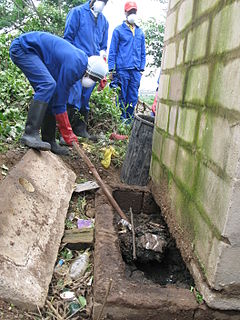
A sanitation worker is a person responsible for cleaning, maintaining, operating, or emptying the equipment or technology at any step of the sanitation chain. This is the definition used in the narrower sense within the WASH sector. More broadly speaking, sanitation workers may also be involved in cleaning streets, parks, public spaces, sewers, stormwater drains, and public toilets. Another definition is: "The moment an individual’s waste is outsourced to another, it becomes sanitation work." Some organizations use the term specifically for municipal solid waste collectors, whereas others exclude the workers involved in management of solid waste sector from its definition.

Lusaka is the capital and largest city of Zambia. It is one of the fastest developing cities in southern Africa. Lusaka is in the southern part of the central plateau at an elevation of about 1,279 metres (4,196 ft). As of 2019, the city's population was about 3.3 million, while the urban population is estimated at 2.5 million in 2018. Lusaka is the centre of both commerce and government in Zambia and connects to the country's four main highways heading north, south, east and west. English is the official language of the city administration, while Nyanja and Bemba are the commonly spoken street languages.
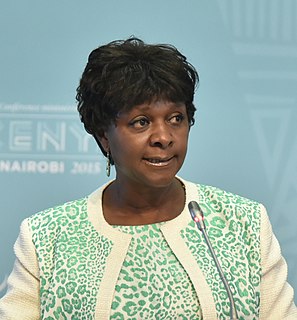
Margaret Mhango Mwanakatwe is a Zambian politician who was the Minister of Finance from 14 February 2018 to 14 July 2019. She worked previously as a businesswoman, accountant, and bank executive. She was the director for business development in Anglophone Africa at the United Bank for Africa at the bank's headquarters in Lagos, Nigeria. In this role, she supervised business development in Cameroon, the Democratic Republic of the Congo, Ghana, Kenya, Liberia, Mozambique, Tanzania, Uganda, and Zambia. Before that, she served as the managing director and chief executive officer of the United Bank for Africa Uganda Limited from March 2009 until May 2011.

The Ministry of Human Resources, abbreviated MOHR, is a ministry of the Government of Malaysia that is responsible for skills development, labour, occupational safety and health, trade unions, industrial relations, industrial court, labour market information and analysis, social security.
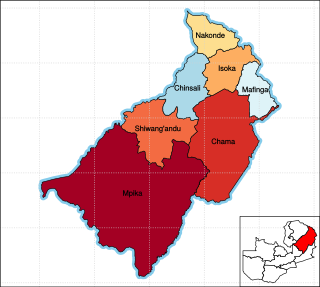
Muchinga Province is one of the ten provinces of Zambia. It is located in the northeast of the country and borders with Tanzania in the north, Malawi in the east, Eastern Province in the south, Central Province in the southwest, Luapula Province in the west, and Northern Province in the northwest. The administrative center of the province is Chinsali.

The Ministry of Commerce, Trade and Industry (MCTI) is a cabinet level government ministry of Zambia. It is responsible for the development of a globally competitive, sustainable, commercial, trade and industrial base in Zambia with the objective of contributing to social and economic development in the country. The ministry is headed by the Minister Commerce, Trade and Industry.
Joyce Nonde-Simukoko a Zambian politician. She is the Minister of Labour and Social Security in the Cabinet of Zambia. She was appointed to that position by Edgar Chagwa Lungu, the president of Zambia, on 15 September 2016.

The Ministry of Gender, Labour and Social Development (MGLSD) is a Cabinet-level government ministry of Uganda. The mandate of the ministry is to empower citizens to maximize their individual and collective potential by developing skills, increasing labour productivity, and cultural enrichment to achieve sustainable and gender-sensitive development. The ministry is headed by a Cabinet minister, Betty Amongi Akena.
The Ministry of Labour, Social Security and Third Sector, commonly referred to as the Ministry of Labour, is a government ministry responsible for policy formulation, industrial relations, acting as a secretariat to the Social Partnership, and the other overall administration and coordination of all operations falling under the Minister of Labour’s portfolio.

The Ministry of Manpower of the Republic of Indonesia is a government ministry responsible for the workers and labour laws of Indonesia. The minister is currently Ida Fauziyah since 23 October 2019.
The National Institute for Safety and Health at Work is an autonomous agency of the Government of Spain. The INSST is considered a technical-scientific agency entrusted with the task of analyze and research on safety and health conditions at work, as well of promoting and supporting the improvement of them, in order to achieve a decrease in occupational hazards, work accidents and occupational diseases.
















